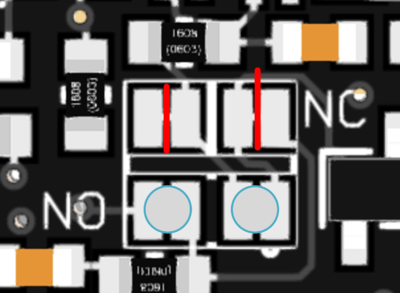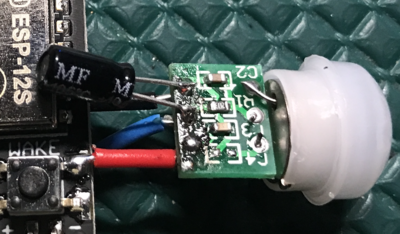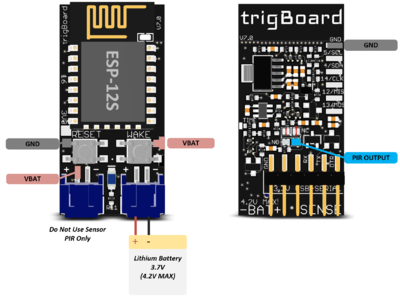Difference between revisions of "TrigBoardMotion"
| Line 13: | Line 13: | ||
= Installation = | = Installation = | ||
| − | '''trigBoard | + | '''trigBoard Setup''' |
| − | + | Cut the top "NC" jumpers as well as the small trace under above the jumper to the right. Also, fill in the bottom "NO" jumpers with solder. '''BE CAREFUL"" cutting the jumpers! It is very easy to slip with the blade and cut more traces than you intended. | |
[[File:PIRtrigBoardjumps.png|400px]] | [[File:PIRtrigBoardjumps.png|400px]] | ||
| + | |||
| + | '''PIR Setup''' | ||
| + | |||
| + | The PIR Sensor will need a 10uF capacitor soldered across the Output to GND - check polarity and make sure the capacitor's negative lead connects to ground: | ||
| + | |||
| + | [[File:Screen Shot 2019-01-22 at 6.47.18 PM.png|400px]] | ||
| + | |||
| + | '''Wiring''' | ||
| + | |||
| + | The PIR sensor has three pins: | ||
| + | |||
| + | + goes to VBAT | ||
| + | - goes to GND | ||
| + | Out goes to PIR Output | ||
| + | |||
| + | [[File:Screen Shot 2019-01-22 at 6.49.40 PM.png|400px]] | ||
Revision as of 17:50, 22 January 2019
...Back to Projects:
Low power PIR sensors can be tricky to get right - here's a way to get a push notification any time motion is detected within a room. Since the trigBoard uses less than 1uA of standby current, we need to find a PIR sensor that uses very little current, especially because these sensors need to be "always on". I found one that pulls 10-12uA, so this is a perfect fit for this... plus they're pretty inexpensive. That amount current is still pretty low, so with a 1000mAh battery or so, you can expect very long battery life.
Parts needed
- PIR Sensor based on the AM312: https://www.amazon.com/gp/product/B07GJDJV63/ref=ppx_yo_dt_b_asin_title_o00__o00_s00?ie=UTF8&psc=1
- 10uF capacitor - any would work that you have lying around.
- trigBoard & battery
Installation
trigBoard Setup
Cut the top "NC" jumpers as well as the small trace under above the jumper to the right. Also, fill in the bottom "NO" jumpers with solder. BE CAREFUL"" cutting the jumpers! It is very easy to slip with the blade and cut more traces than you intended.
PIR Setup
The PIR Sensor will need a 10uF capacitor soldered across the Output to GND - check polarity and make sure the capacitor's negative lead connects to ground:
Wiring
The PIR sensor has three pins:
+ goes to VBAT - goes to GND Out goes to PIR Output


